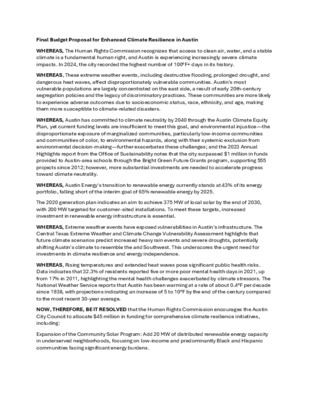Back Up Agenda Item 34_Enhanced Climate Resilience in Austin from the Human Rights Commission — original pdf
Backup

Final Budget Proposal for Enhanced Climate Resilience in Austin WHEREAS, The Human Rights Commission recognizes that access to clean air, water, and a stable climate is a fundamental human right, and Austin is experiencing increasingly severe climate impacts. In 2024, the city recorded the highest number of 100°F+ days in its history. WHEREAS, These extreme weather events, including destructive flooding, prolonged drought, and dangerous heat waves, affect disproportionately vulnerable communities. Austin's most vulnerable populations are largely concentrated on the east side, a result of early 20th-century segregation policies and the legacy of discriminatory practices. These communities are more likely to experience adverse outcomes due to socioeconomic status, race, ethnicity, and age, making them more susceptible to climate-related disasters. WHEREAS, Austin has committed to climate neutrality by 2040 through the Austin Climate Equity Plan, yet current funding levels are insufficient to meet this goal, and environmental injustice—the disproportionate exposure of marginalized communities, particularly low-income communities and communities of color, to environmental hazards, along with their systemic exclusion from environmental decision-making—further exacerbates these challenges; and the 2023 Annual Highlights report from the Office of Sustainability notes that the city surpassed $1 million in funds provided to Austin-area schools through the Bright Green Future Grants program, supporting 555 projects since 2012; however, more substantial investments are needed to accelerate progress toward climate neutrality. WHEREAS, Austin Energy's transition to renewable energy currently stands at 43% of its energy portfolio, falling short of the interim goal of 65% renewable energy by 2025. The 2020 generation plan indicates an aim to achieve 375 MW of local solar by the end of 2030, with 200 MW targeted for customer-sited installations. To meet these targets, increased investment in renewable energy infrastructure is essential. WHEREAS, Extreme weather events have exposed vulnerabilities in Austin's infrastructure. The Central Texas Extreme Weather and Climate Change Vulnerability Assessment highlights that future climate scenarios predict increased heavy rain events and severe droughts, potentially shifting Austin's climate to resemble the arid Southwest. This underscores the urgent need for investments in climate resilience and energy independence. WHEREAS, Rising temperatures and extended heat waves pose significant public health risks. Data indicates that 32.3% of residents reported five or more poor mental health days in 2021, up from 17% in 2011, highlighting the mental health challenges exacerbated by climate stressors. The National Weather Service reports that Austin has been warming at a rate of about 0.4°F per decade since 1938, with projections indicating an increase of 5 to 10°F by the end of the century compared to the most recent 30-year average. NOW, THEREFORE, BE IT RESOLVED that the Human Rights Commission encourages the Austin City Council to allocate $45 million in funding for comprehensive climate resilience initiatives, including: Expansion of the Community Solar Program: Add 20 MW of distributed renewable energy capacity in underserved neighborhoods, focusing on low-income and predominantly Black and Hispanic communities facing significant energy burdens. Development of Neighborhood Resilience Hubs: Establish 15 hubs equipped with backup power, cooling centers, and emergency supplies in heat-vulnerable communities to address health risks posed by extreme heat. Urban Tree Planting Program: Implement a comprehensive program to add 50,000 trees, prioritizing neighborhoods with the highest urban heat island effect, as identified in the Austin Climate Equity Plan, to mitigate extreme temperatures and improve air quality. Climate-Ready Infrastructure Fund: Upgrade stormwater systems, expand permeable surfaces, and protect critical facilities from flooding, particularly in areas identified as vulnerable in the Central Texas Extreme Weather and Climate Change Vulnerability Assessment. Residential and Commercial Weatherization and Energy Efficiency Program: Serve 5,000 low- income households annually by improving insulation, installing energy-efficient appliances, and supporting solar installations to reduce energy costs and enhance resilience to heat waves. Additionally, commercial rental properties may qualify for this program through upgrades that enhance energy efficiency, lower operational costs, and improve tenant comfort, promoting sustainability in both residential and commercial spaces. Expansion of the Electric Vehicle Charging Network: Install 200 new public charging stations and offer rebates for 1,000 low- and moderate-income residents to transition to electric vehicles, improving mobility and reducing the city's carbon footprint. In Texas, this initiative must align with state utility regulations, zoning laws, and potential funding from state grants or incentives. Additionally, compliance with Public Utility Commission guidelines and coordination with local energy providers will be necessary to ensure seamless integration. The city's capacity depends on infrastructure readiness, utility partnerships, and equitable distribution to ensure accessibility while maintaining grid stability. Water Conservation Infrastructure Development: Implement systems such as rainwater harvesting and xeriscaping in public spaces to reduce drought risks and conserve water resources. NOW, THEREFORE, BE IT FURTHER RESOLVED that the Human Rights Commission calls on the City to ensure equitable distribution of climate resilience investments, focusing on communities with the highest climate vulnerability index scores as identified in the Austin Climate Equity Plan, particularly those most impacted by extreme heat, flooding, and air pollution. NOW, THEREFORE, BE IT FURTHER RESOLVED that the Human Rights Commission recommends the creation of a Climate Equity Advisory Committee, comprising environmental justice advocates, climate scientists, community representatives from vulnerable neighborhoods, and sustainability experts, to guide the implementation of these initiatives and ensure they address the needs of those most affected by climate change.